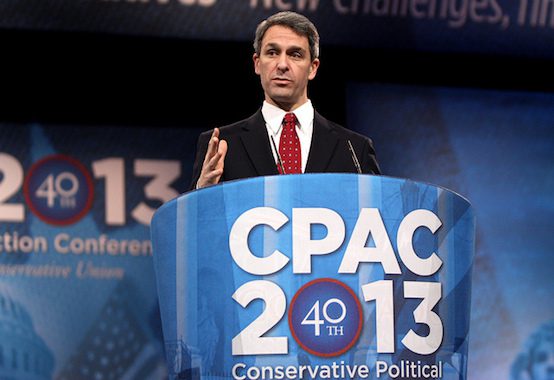Ken Cuccinelli’s Collapse

Next week Virginians will head to the polls to elect a new governor. It is a race that, on paper, Republicans should win. But the paper the polls are printed on says otherwise.
The GOP standard-bearer is Ken Cuccinelli, a prominent conservative who hails from the critical Northern Virginia suburbs—he lives in Prince William County and was elected to the state legislature from Fairfax County—and won the attorney general’s race with 58 percent of the vote just four years ago. His constitutional challenge to Obamacare did not prevail at the Supreme Court, but it would seem at least somewhat vindicated by the law’s metastasizing implementation problems.
Cuccinelli’s opponent is Terry McAuliffe, a politically connected businessman and Democratic rainmaker who was trounced in the Democratic primary four years ago. Having emerged as a major player and fundraiser during the Clinton years, many of his own supporters have misgivings about the Democrat’s business dealings and crony capitalism.
Yet the once-red commonwealth seems poised to choose a liberal Democrat who has never before held elected office over a successful conservative Republican who once seemed to have a bright future in Virginia—and perhaps national—politics.
Some of Cuccinelli’s problems are specific to Virginia. Despite his Northern Virginia roots, he has campaigned relatively lightly in the D.C. suburbs, where he has been buffeted with ads targeting his social conservatism. Making inroads in the region while maintaining a strong base of support in the conservative southern portion of the state was the key to the GOP’s success in 2009.
Not only has Virginia Gov. Bob McDonnell gone from being a popular incumbent to an embarrassment for his party, Lt. Gov. Bill Bolling has been a persistent thorn in Cuccinelli’s side. The Republican is constantly chiding his own party’s nominee for being insufficiently “mainstream.”
Bolling wanted to be the Republican candidate for governor himself, but decided not to run when the state party indicated that it would hold a convention to determine the nomination. Republicans may now wish they had held a primary—which Bolling probably still would have lost, albeit at greater financial cost to Cuccinelli—instead.
Bolling decided against running as an independent, but his refusal to endorse Cuccinelli has encouraged other Republican defectors. Some, like former Gov. Linwood Holton, are longtime moderates. Others simply don’t like Cuccinelli.
Such intraparty spats have plagued Virginia Republicans before. In 1994, former Attorney General Marshall Coleman bolted the party to run as an independent senatorial candidate against Oliver North, with the support of then Sen. John Warner and other moderates. Jim Webb, who had endorsed Republican George Allen for Senate in 2000, became a Democrat and unseated him six years later.
Yet some of the things that are hurting Cuccinelli have been problems for Republicans nationwide. Many voters see the party as too radical, either in the sense of being too conservative or too anti-government. Others see it as too compromising and too comfortable with big government.
The polls showed a backlash against Texas Sen. Ted Cruz and other Republicans whose strategy for defunding Obamacare led to a political stalemate that produced a government shutdown. But the activists cheering Cruz and his allies wanted someone to put up a fight against this latest expansion of the federal government.
In the 2012 election, Republicans were hit for proposing to cut government spending and regulations too deeply. At the same time, they saw thousands of votes—and, in the case of Gary Johnson’s presidential campaign, over 1 million—siphoned by Libertarian Party candidates.
Cuccinelli suffers from both of these problems. According to some polls, Libertarian candidate Robert Sarvis is drawing as much as 10 percent of the vote. While it would be a surprise if Sarvis actually broke into the double digits, his pull on potential Cuccinelli voters will be non-trivial. Consider George Will a prominent example.
One reason Cuccinelli—a Syria intervention opponent who has been endorsed by Ron and Rand Paul and whose campaign includes young libertarian activists—is losing liberty-minded voters, as well as moderates, is that he’s viewed as endorsing a lifestyle police. A common refrain in anti-Cuccinelli ads is that he is “too extreme,” or that he “has his own agenda,” making him too ideological for common-sense governance.
Some of these anti-Cuccinelli complaints are hyperbolic. His position on emergency contraception is controversial, but not quite the same as returning to the days before Griswold v. Connecticut concerning the pill. Cuccinelli’s efforts to revive parts of his state’s anti-sodomy laws which were being used to prosecute sex offenders and child predators may have been ill-advised, but they are not an attempt to re-criminalize adult consensual behavior.
Nevertheless, after more than a year of Democratic success with the “war on women” angle, one might think the Republican gubernatorial candidate would have seen these attacks coming. Alan Keyes didn’t get bogged down in birth control discussions as often as official party nominees do today.
A McAuliffe win would not only be a much-needed shot in the arm for the Democrats ahead of the 2014 elections. If Cuccinelli loses as Chris Christie is resoundingly reelected in New Jersey, it will have reverberations within the Republican Party three years from now.
The cause of electing a conservative president would be best served by electing more conservative governors. Virginia was once a prime state for doing so.
W. James Antle III is editor of the Daily Caller News Foundation and author of Devouring Freedom: Can Big Government Ever Be Stopped?
Comments